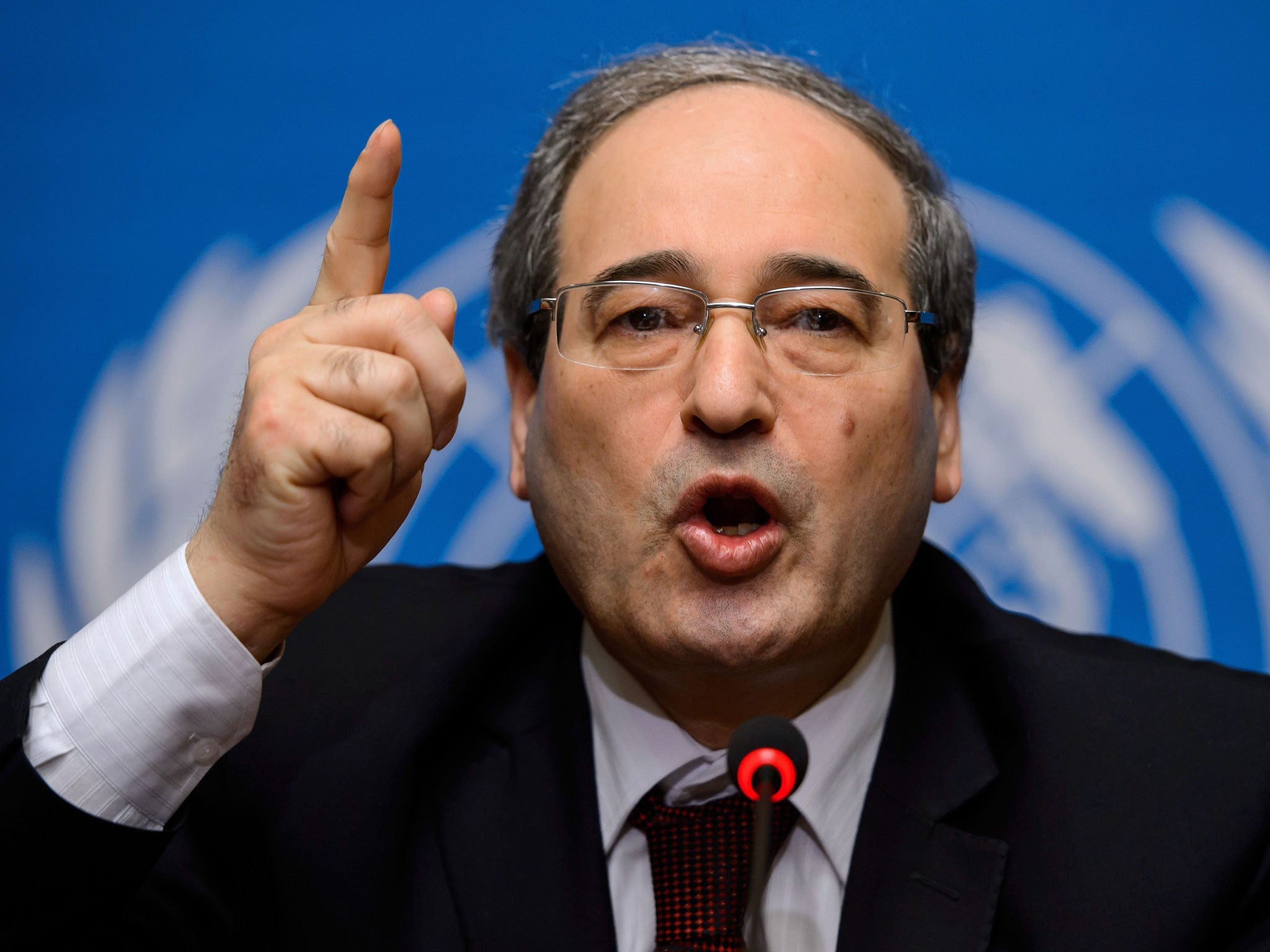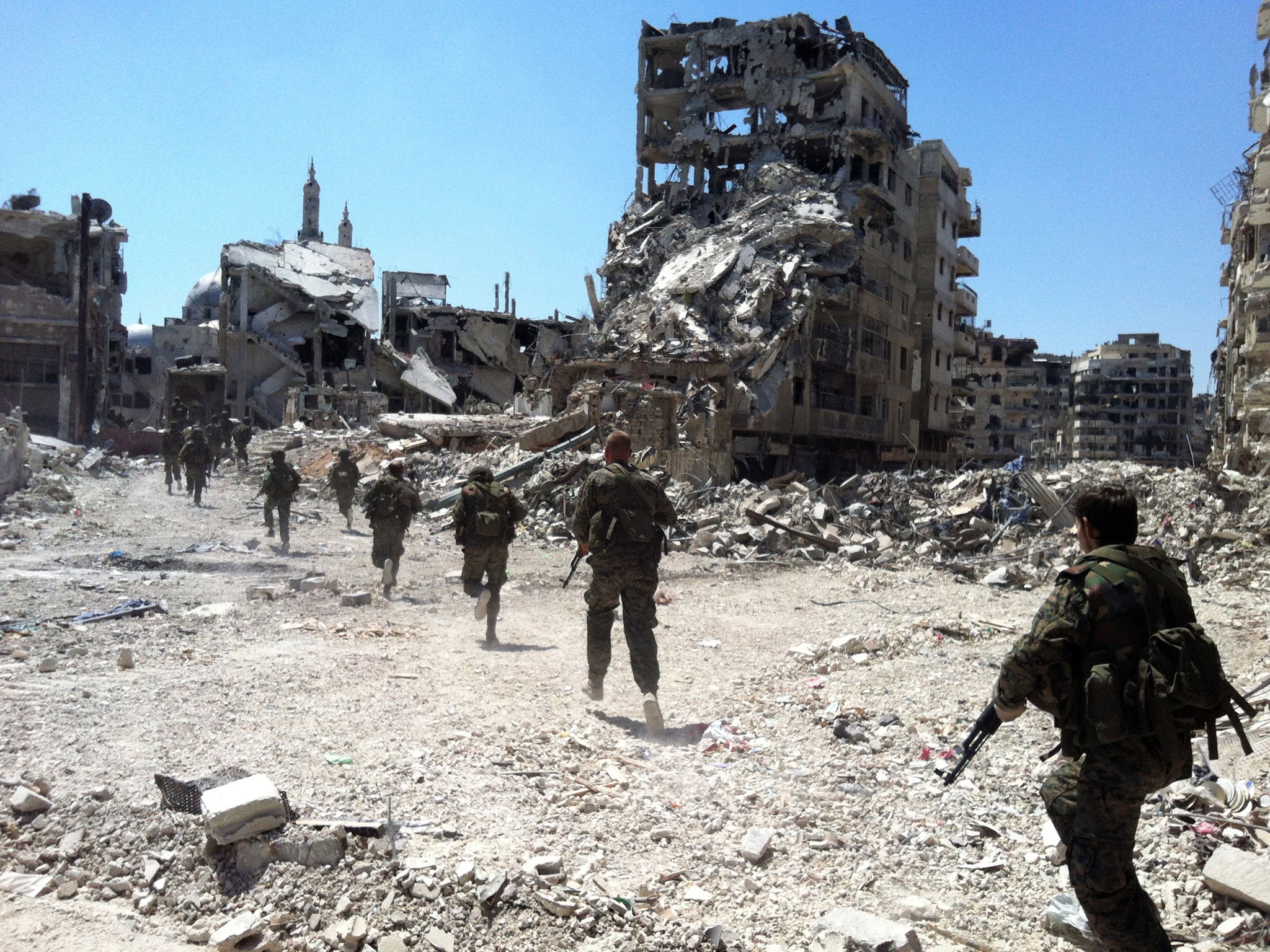Syria Geneva II talks: Breakthrough on easing siege of Homs, but peace agreement still remains far off
Women and children will be allowed to exit the besieged Syrian city, although restrictions on men leaving have raised fears of another Srebrenica. Kim Sengupta reports on small signs of progress at the UN peace talks

Your support helps us to tell the story
From reproductive rights to climate change to Big Tech, The Independent is on the ground when the story is developing. Whether it's investigating the financials of Elon Musk's pro-Trump PAC or producing our latest documentary, 'The A Word', which shines a light on the American women fighting for reproductive rights, we know how important it is to parse out the facts from the messaging.
At such a critical moment in US history, we need reporters on the ground. Your donation allows us to keep sending journalists to speak to both sides of the story.
The Independent is trusted by Americans across the entire political spectrum. And unlike many other quality news outlets, we choose not to lock Americans out of our reporting and analysis with paywalls. We believe quality journalism should be available to everyone, paid for by those who can afford it.
Your support makes all the difference.Women and children trapped by the Syrian regime’s siege of the city of Homs will be given a chance to leave, in the first tentative signs of a breakthrough at the Geneva negotiations between the Assad regime and rebels.
The development was announced by Lakhdar Brahimi, the United Nations mediator, at the end of the second day of talks between the two sides as part of “confidence building measures” before moving on to attempts to form a transitional administration.
Men trying to get out of the same area in Homs would be allowed to do so only after a list of names had been submitted to Bashar al-Assad’s security forces to ensure they “were not members of armed groups”, Mr Brahimi said. He denied there were dangers of parallels with Srebrenica in the Balkans in 1995, when a similar list was used by Serbian troops to arrest and kill thousands of Bosnian men and boys.
“There are so many horrible things happening in Syria, we don’t want a Srebrenica situation to add to this,” said the mediator, who added that efforts were continuing to secure the release of prisoners.
The opposition produced a list of more than 47,000 detainees they wanted freed, about 2,500 of whom were women and children, they said. In turn they agreed to provide the names of those being held by the rebels to Mr Brahimi and the delegation from Damascus.
However, disputes began immediately on the issue. Monzer Akbik, the chief of staff to the head of the opposition coalition, said of the detainee release: “We are seeking the end of the nightmare of our country. There are thousands of families wondering where their loved ones are. They are crying every day wondering if they are being tortured. Their loved ones have been kidnapped by the regime police forces and they don’t know where they are.”
But Faisal Makdad, the deputy foreign minister, insisted that “we don’t hold any children prisoners at all. We categorically deny that.” He claimed that the list supplied by the opposition was full of errors. “I have studied this list; 60 to 70 per cent of the names are not in prison, 20 per cent have already been freed. About the rest, we don’t know anything.”
There were also fundamental difficulties with the concept of prisoner exchanges. The coalition representing political opponents of the Assad regime have no power over extremist Islamist groups such as the Islamic State of Iraq and al-Sham (Isis) and Jabhat al-Nusra, which hold most of the hostages.
However, officials of the international states which have been backing the opposing sides in the conflict said the fact that the talks had not collapsed, as some had predicted, and that limited progress was being made, were significant signs of encouragement.
Attempts were continuing last night to get around a stalemate over plans to establish a humanitarian corridor into Homs. Convoys carrying food and medicine were stuck on the road waiting for permission from Damascus to pass regime checkpoints and continue to the city. Senior international diplomats and officials, including Mr Brahimi, had stated that the aid could reach civilians trapped amid the relentless violence within 48 hours.
The Russians and the Americans had been working behind the scenes, speaking to both sides, and the International Committee of the Red Cross was ready to move. But the regime is said to have professed surprise at the proposal, claiming it knew nothing about it; this was directly contradicted by senior diplomatic sources who insist that the Russians had presented the plan to Damascus more than a week ago.
Mr Brahimi acknowledged that the failure to get aid into Homs had disappointed him. But he stressed that “to bring Syria out of the ditch where it has fallen will take time.” More than 130,000 people have died so far in the civil war, while nine million have been made homeless inside and outside the country.
Homs had a population of more than one million before the start of the conflict. Many have died, many more have fled, and about 800 families are now trapped with little access to food, medicine and water.
Mr Makdad maintained that his administration had been trying to send essential supplies to help the beleaguered residents. Not as much as he would have liked had got through, for two reasons: “The armed groups had kept firing at those who tried to take in aid and the weather has not been conducive to making the movement.
“As for the trapped women and children, that was the result of the armed groups not allowing a single child to get out. Now if they allow the women and children to get out, we shall provide them with shelter, food and all the needs of life.”

Influential members of the regime’s delegation objected to the whole concept of the Homs aid efforts. Bouthaina Shaaban, an adviser to President Bashar al-Assad and a member of the delegation, declared: “This is a matter which should be dealt with through the Red Cross, Red Crescent, though OCHA [the UN’s Office for the Co-ordination of Humanitarian Affairs]. This is not something for this conference with [political] delegations. We do not like this ‘humanitarian corridor’ because they can also be used as military corridors to get control.
“Anyway, our local authorities are doing all they can, not just for the people of Homs, but Aleppo, Daraa, Adra. The other side came here to discuss a small problem here or there, we came here to discuss the future and security of Syria, not to bring relief to a region here or there.” The Information Minister, Omran Zoabi, added: “They proposed Homs. We say all Syrian cities are equal and as important”.
The talks are now due to move on to the setting up of a “transitional administration”, the key aim of the Geneva I Communique, issued after a previous meeting on Syria. The rebels and their Western backers have consistently held that Mr Assad can play no part in this; the regime is equally adamant that the President’s position is sacrosanct.
Still, the current talks are expected to move on to discussions about a transitional government. Both sides say they will take part in the talks on transition, but Mr Zoabi declared on their eve: “If anybody thinks there is a possibility of the stepping down of President Bashar al-Assad, they live in a mythical world and let them stay in Alice in Wonderland.”
Join our commenting forum
Join thought-provoking conversations, follow other Independent readers and see their replies
Comments